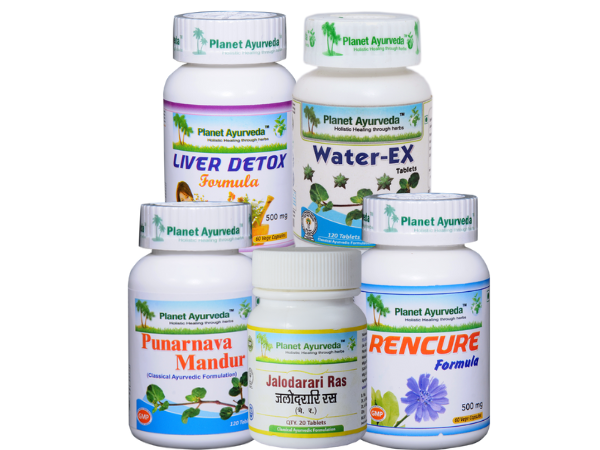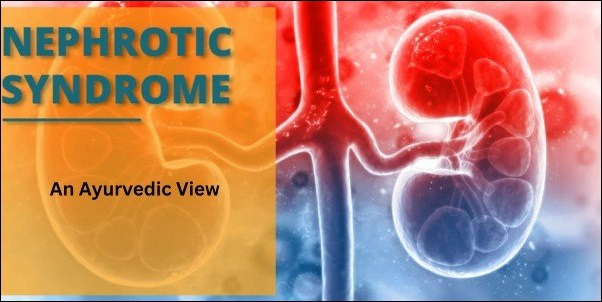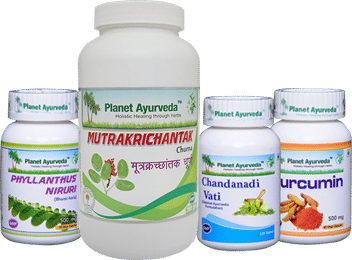Ascites – How Ayurvedic Medicines Can Help You Treat It?
ABSTRACT
Ascites is a pathological condition in which fluid accumulates in a peritoneal(Abdominal) cavity. It is also known as peritoneal cavity fluid, peritoneal fluid excess, hydroperitoneum, and abdominal dropsy.In this article, we are going to discuss Ascites in detail and its management in Ayurveda.
INTRODUCTION
Ascites is an abnormal collection of fluid in the peritoneal cavity. As fluid collects in the abdomen, it can affect the lungs, kidneys, and other organs of the body. Fluid is pale yellow in colour known as Ascetic fluid. In Ayurveda. Ascites is explained under Jalodar which is a type of Udar Rog. Udar rog consider in astamahagada.

TYPES
On the basis of the amount of protein present in the fluid. It is of 2 types:- Transudative and Exudative.
- Transudative Ascities:- when the patient’s SAAG(serum ascites albumin gradient) level is greater than or equal to 1.1 g/dL.
- Exudative Ascites:- when the patient’s SAAG ( serum ascites albumin gradient) level is less than or equal to 1.1g/dL.
CAUSES
Liver cirrhosis is the main cause of the ascites. Ascites can be caused by many other problems such as:-
- Transudative causes:- Cirrhosis, Heart failure, Hepatic venous occlusion, Kwashiorkor ( childhood protein-energy malnutrition )
- Exudative causes:- Cancer, Pancreatitis, Nephrotic syndrome
- Other causes:- Meigs Syndrome, Vasculitis, hypothyroidism, Renal dialysis
SYMPTOMS
Ascites patients have the following symptoms such as
- Abdominal distension
- Increasing weight
- Pedal edema
- Respiratory distress
- Feeling of heaviness
- Nausea
- Vomiting
- Swelling in the abdomen
COMPLICATION
Complications associated with the ascites are
- Pleural effusion
- Hepato renal syndrome
- Umbilical hernia
- Spontaneous bacterial peritonitis
DIAGNOSIS
Diagnosis will be done on the basis of a physical examination of the patient and various tests such as:-
- Chest and plain abdominal films:- Elevation of diaphragm seen in massive ascites.
- Abdominal ultrasound:- For the site of paracentesis
- CT And MRI:- To check small amounts of fluid in the spaces like perihepatic space, and morisson pouch.
- Blood test :- To check the SGOT And SGPT level and CBC count in a patient
- Physical examination of the patient:-
1. In mild cases of ascites
- The physical appearance is seen as normal because fluid is not seen without ultrasound.
2. In moderate cases of ascites
- The abdomen appears seen differently. Shifting dullness is seen in the patient ( shifting dullness is a sign that is noticed by a person that as he shifts or turns on another side of the body, fluid will go to the dependent part of the abdominal cavity).
3. In severe cases of Ascites
- The patient complains of various symptoms such as pressure feeling on the abdomen, and heaviness of the abdomen. On heaviness of the abdomen as the physician presses the abdomen on one side the fluid wave generates on the other side of the abdomen known as Fluid thrill.
A Puddle sign is also noticed when the small amount of ascitic fluid is up to 120 ml which is not detected by Fluid thrill and Shifting dullness.
TREATMENT
- Medical treatment
- Avoiding alcohol
- Lowering salt in diet ( No more than 1500 mg/day of sodium)
- Diuretics
- Anti-inflammatory drugs
- Surgical treatment
- Paracentesis:- By pricking a needle fluid is removed through the abdomen.
- TIPS(Transjugular intrahepatic portosystemic shunts)- Treat the fluid form in the abdomen.
- Liver transplant:- In case of liver cirrhosis, when liver failure is there.
AYURVEDA ASPECT FOR ASCITES
In Ayurveda, ascites are explained under Jaloder rog which is a type of Udar rog. Udar rog is of 8 types and its last condition is Jaloder (Ascites). It is a chronic disease so Acharya said its prognosis is bad. It involves all three doshas so it is Tridoshaj vyadhi (disease).
JALODAR
As per च.चि. १३
Due to the aggravation of vata dosha, there is an accumulation of vata dosha in the cavity of the abdomen (udar) and swelling of Udar Pradesh known as Jalodar.
NIDANA (CAUSE)
The following are the causes
- Mithya ahar (improper diet)
- Mithya vihar (improper activities)
- Excess alcohol consumption
- Sitting work, without any exercise
SAMPRAPTI (PATHOPHYSIOLOGY)
(च.चि. १३।४५-४६)
After Snehapan (oleation therapy) or the person becomes lean or drinks excessive water after this their agni (digestive fire) is destroyed and air fills in Vessel(Klomanalika). Channels are blocked and fluid is stored in the abdomen and causes Jaloder(Ascites).
SAMPRAPTI GHATAK
- Dosha- Tridosha (apan and prana vayu vikriti)
- Dusya – Ras,Udaka,Sveda
- Agni – Jatharagni, Dhatvagni
- Ama – Jatragnimandhyajanya
- Srothas – Rasvaha, Swedavaha, Ambuvaha
- Sanchara- Siras
- Sroto dusti prakara – Sanga, Vimargagamana
- Udbava sthana -Amashayodbhava
- Vyaktha sthana – Udara
- Adisthana- Udara
- Marga – Abhyanthara, Baahya
POORAVROOP (PRELIMINARY SIGN )
Following are the preliminary signs of ascites
- Aadhman (bloating in the stomach)
- Atipipasa (drink more water)
- Udharshool (abdominal distension)
- Swash dhourbalya (difficulty in breathing)
LAKSHNA ( SYMPTOMS)
The following are the symptoms
- Kaash (cough)
- Aruchi (Anorexia )
- Hridyaspandan (Palpitations)
- Everted umbilicus
- Nanavarna raji sira ( seen lines on abdomen)
UPDRAVA (COMPLICATIONS)
- Vaman (Vomiting)
- Atisar (Diarrhoea)
- Tamak Swasa (Asthma)
- Trishna (Excessive thirst)
- Swasa (Difficulty in breathing)
- Kaash (Cough)
- Hikka (Hiccough)
- Aruchi (Anorexia)
- Mutraghata (Urinary retention)
HERBAL REMEDIES FOR ASCITES BY PLANET AYURVEDA
Planet Ayurveda provides the best combination of herbal drugs that help the patient to cure it. The herbs are pure and free from any type of adulterant, preservative, or chemicals. They are safe to use and free from any side effects.
The formulation offered by Planet Ayurveda for ascites are follows as:-
Product list
- PUNARNAVA CAPSULES
- WATER-EX TABLETS
- RENCURE FORMULA
- LIVER DETOX CAPSULES
- JALODARARI RASA
Product Description for Ascites
1. PUNARNAVA CAPSULES
Punarnava capsules are made of the single heb extraction of Punarnava (Boerhavia diffusa). As punarnava is a natural diuretic it helps in reducing fluid. It also has anti-inflammatory properties and it helps in reducing swelling of the abdomen. It also balances the vata and kapha dosha.
Dosage:- 1-2 capsules twice daily, with plain water, after meals.
2. WATER-EX TABLETS
Water-Ex tablets are a mixture of poly herbs. It contains Punarnava (Boerhavia diffusa), Varuna (Crataeva nurvala), Gokshura (Tribulus terrestris) and Excipient. As Gokshura is anti-inflammatory and diuretic it helps in symptoms of urinary retention and swelling. Varuna pacifies the kapha and vata dosha. It expels the ascitic fluid from the body.
Dosage:– 1-2 tablets once or twice daily.
3. RENCURE FORMULA
Rencure formula has a mixture of many poly herbs which are safe and effective in Ascites. It contains Punarnava (Boerhavia diffusa), Varuna (Crataeva nurvala), Gokshura (Tribulus terrestris), Palaash (Butea monosperma), Kasni (Cichorium intybus). It balances all three vata, pitta, and kapha dosha. These herbs are natural diuretics so give relief from ascites. As it has anti-diarrhea properties it can be given in its complications.
Dosage:- 1-2 capsules twice daily, with plain water, after meals.
4. LIVER DETOX CAPSULES
It is made of a mixture of poly herbs like Katuki (Picrorhiza kurroa), Punarnava ( Boerhavia diffusa), Kalmegh (Andrographis paniculata), Makoy (Solanum nigrum), Haritaki (Terminalia chebula) and many other herbs. It is natural liver detoxification and improves the blood flow of the liver. As it helps in digestion and removes toxins from the body. It rejuvenates the liver and helps in managing liver disease.
Dosage:– 1-2 capsules twice daily, with plain water, after meals.
5. JALODARARI RASA
It is a mixture of many poly herbs and contains Pippali (Piper longum), Maricha (Piper nigrum), Tamra bhasma, Rajani (Curcuma longa), Jaipala (Croton tiglium), Snuhi Ksheera (Euphorbia nerifolia). As above mentioned dravyas are helpful in Virechana karma so they remove excess fluid from the body. It is also helpful in liver disorders.
Dosage:-1 tablet twice daily, with water.
CONCLUSION
Ascites is a life-threatening condition. In Ayurveda, we treat ascites with pure herbs. Ascites care pack helps to reduce Ascites and the root causes of Ascites. Treat the disease according to symptoms. Planet Ayurveda gives herbal remedies for ascites that are safe, effective, and free from any adulterant, preservative, or chemical.





